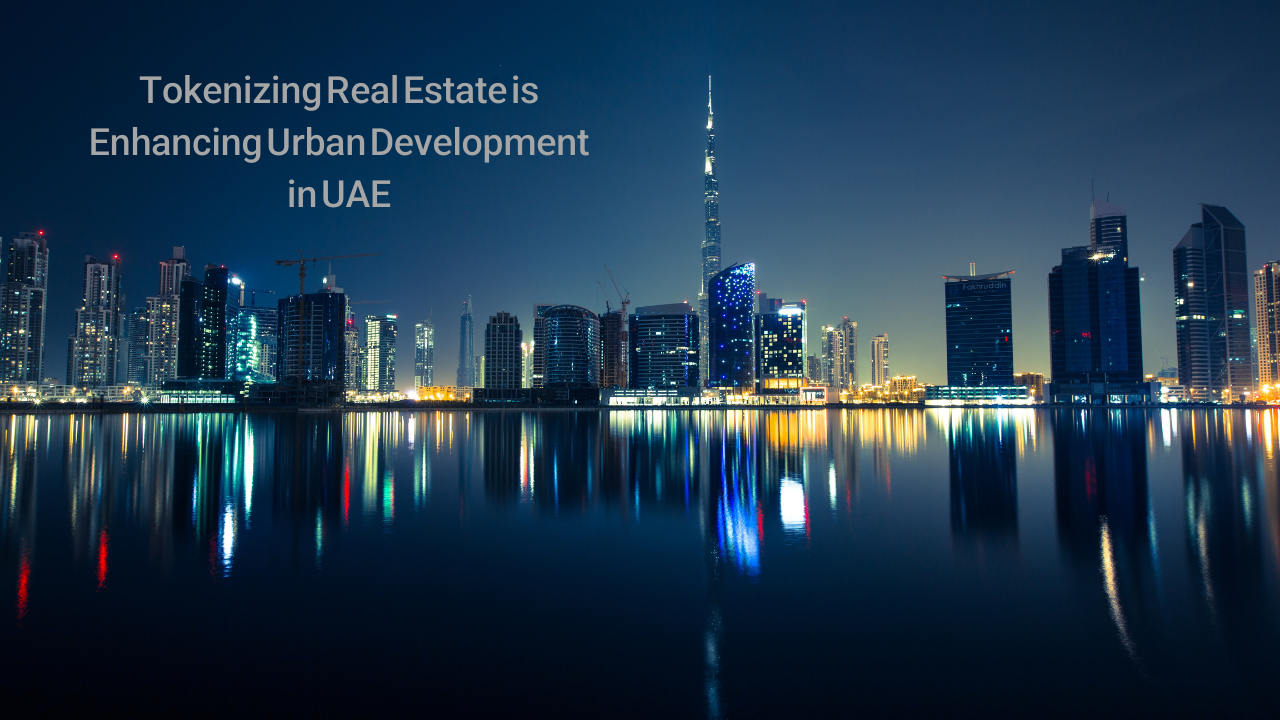

The UAE, known for its visionary approach to economic growth and innovation, has always been at the forefront of embracing technological advancements. One of the most exciting developments in the real estate sector is the tokenization of property. By leveraging blockchain technology, tokenizing real estate is creating new opportunities for urban development, enabling fractional ownership, and improving liquidity for investors. In the UAE, particularly in cities like Dubai and Abu Dhabi, tokenizing real estate is enhancing urban development by making real estate more accessible, transparent, and efficient.
Dubai City Evolution 1980 – 2023
This AI-generated animation presents the evolution of Dubai City between 1980 and 2023, showcasing the transformation through the years. pic.twitter.com/RdVbdT1HJo
— Fatloss ☘️ (@XTheJade) November 12, 2023
This article explores how tokenization is transforming the real estate market and fostering the growth of sustainable urban development in the UAE.
What is Tokenizing Real Estate?
Tokenizing real estate refers to the process of converting property ownership into digital tokens on a blockchain. Each token represents a share in a specific property or development, allowing investors to own fractions of real estate assets rather than having to buy entire properties. Investors can trade, buy or sell these digital tokens on blockchain platforms, democratizing access to real estate investments.
Key Benefits of Tokenizing Real Estate:
- Fractional Ownership: Investors can buy smaller portions of a property, making real estate investments more accessible.
- Liquidity: Investors can trade real estate tokens on secondary markets, increasing the liquidity of traditionally illiquid assets.
- Transparency: Blockchain technology ensures of recording every transaction immutably, providing full transparency in ownership and the transfer of assets.
- Global Access: Investors from around the world can access tokenized real estate markets, broadening the pool of potential buyers.
The Role of Tokenization in Urban Development in the UAE
Urban development in the UAE has been characterized by rapid expansion, cutting-edge architecture, and ambitious projects that aim to transform cities like Dubai and Abu Dhabi into global hubs. Tokenizing real estate is playing an instrumental role in shaping this transformation by enabling the growth of new urban developments that are more inclusive, sustainable, and efficient.
1. Boosting Investment in Large-Scale Urban Projects
The UAE’s urban landscape has evolved drastically over the last few decades, with mega-projects like the Palm Jumeirah, Dubai Marina, and Expo 2020 site symbolizing the country’s ambitious vision. Tokenization allows developers to raise capital from a broader pool of investors, both locally and internationally.
Traditionally, large-scale urban developments require significant capital upfront, often sourced from a small group of institutional investors or high-net-worth individuals. Tokenizing real estate allows smaller investors to pool their resources by purchasing fractional ownership in the development. This opens the door to a more diverse group of investors, increasing access to capital for developers and accelerating the growth of urban projects.
For example, a developer in Dubai can tokenize a new mixed-use development in Business Bay, enabling both local and international investors to contribute smaller amounts of capital towards the project.
2. Creating More Affordable and Accessible Housing
One of the challenges facing urban development in the UAE, particularly in high-demand cities like Dubai, is the affordability of real estate. With property prices rising steadily, many potential investors and homebuyers find it difficult to enter the market. Tokenization of real estate helps to alleviate this issue by lowering the barrier to entry for both individual investors and end users.
Tokenized real estate offers fractional ownership, which allows a larger pool of individuals to invest in high-value properties. For example, someone with a smaller budget can purchase a fraction of an apartment in a luxury development rather than being locked out of the market.
In terms of residential development, the impact of tokenization on affordable housing projects in the UAE could be significant by making it easier for developers to access capital for affordable housing projects. As a result, urban development becomes more inclusive and balanced.
3. Increasing Liquidity and Speed in the Real Estate Market
Tokenization introduces liquidity into the real estate market by dividing properties into smaller, tradable units. Investors can buy and sell these units more quickly than traditional real estate assets, improving market efficiency.
With tokenized real estate, buyers can quickly purchase or sell their shares in a development through blockchain platforms. This is particularly advantageous in the UAE’s rapidly evolving real estate market, where speed and flexibility are crucial. If an investor needs to liquidate an asset or adjust their portfolio, they can do so with much less friction compared to traditional real estate, where selling a property can take months.
For developers, this liquidity encourages faster construction and development timelines. When there is a consistent flow of investment, urban development projects can progress more smoothly, with fewer delays. This accelerates the overall pace of urbanization, enabling Dubai and other UAE cities to expand at a faster rate.

4. Promoting Sustainable and Green Developments
Sustainability is a central focus of the UAE’s urban development plans, with significant efforts being made to build energy-efficient, environmentally friendly infrastructure. Tokenization is helping developers raise capital for sustainable projects by offering green bonds or tokens linked to eco-friendly developments.
For example, developers can issue tokens that represent ownership stakes in green buildings or sustainable urban developments. These tokenized investments can attract investors who are specifically interested in supporting sustainable initiatives, thus aligning capital with the growing demand for eco-friendly infrastructure.
Moreover, tokenizing real estate makes it easier for developers to secure funding for innovative green technologies, such as solar power, water recycling, and energy-efficient building designs. With blockchain’s transparency, investors can also track the environmental impact of their investments, ensuring that the utilization of their capital is in line with sustainability goals.
5. Enhanced Transparency and Trust in Urban Development
One of the key benefits of blockchain technology, and by extension, tokenized real estate, is its inherent transparency. Every transaction conducted on the blockchain is recorded on a public ledger, ensuring that all parties involved in a real estate transaction have access to accurate, immutable records. This transparency builds trust in the real estate market, which is critical for fostering long-term growth and development.
For urban developments, transparency is crucial to mitigating the risks associated with construction delays, budget overruns, or fraud. Tokenized real estate projects can provide investors with real-time access to key project milestones, budgets, and timelines, improving accountability. Additionally, all transactions involving the buying and selling of tokens can be tracked, ensuring that ownership rights are properly documented and preventing fraud.
6. Empowering International Investment in UAE Urban Projects
The UAE real estate market has long attracted international investors, particularly from Europe, Asia, and the Middle East. However, traditional property transactions often require buyers to navigate complex legal frameworks and currency exchanges. Tokenization boosts foreign investment in the Dubai real estate sector as well as the UAE by eliminating many of these barriers, enabling a global pool of investors to participate in urban development projects in the UAE.
Since tokenized real estate transactions are conducted on blockchain platforms, investors can participate from anywhere in the world, using cryptocurrencies or fiat currencies. This broadens the market for UAE developers and allows for greater diversity in the types of investors supporting urban projects. Additionally, blockchain platforms make it easier for investors to transfer funds securely, reducing the complexities of cross-border payments.
Legal and Regulatory Considerations
Although tokenization is transforming the UAE real estate market, developers and investors must navigate legal and regulatory considerations. The UAE government is actively working to create a regulatory framework for blockchain and cryptocurrency to ensure that tokenized real estate transactions comply with local laws. This framework will help protect investors, ensure transparency, and maintain the integrity of the market.
As regulations evolve, developers and investors must work with legal and financial advisors to ensure compliance with current and future laws regarding tokenization. This includes addressing issues related to property rights, fractional ownership, taxation, and anti-money laundering (AML) compliance.
Conclusion
Tokenizing real estate is enhancing urban development in the UAE by improving access to investment, increasing liquidity, and fostering more sustainable projects. The ability to divide property into digital tokens has opened new avenues for small and large-scale investors, contributing to the expansion and modernization of cities like Dubai and Abu Dhabi. As tokenization continues to gain traction, the UAE is at a good position to remain at the forefront of real estate innovation.
By leveraging blockchain technology, the UAE is not only enhancing its real estate sector but also setting the stage for a new era of smart, sustainable cities that are built on transparency, accessibility, and global collaboration.
Homecubes as a licensed property tokenization platform focusing on the Dubai real estate market has got a range of fractional ownership projects in the pipeline. Contact us confidently for further information on our lucrative fractional investment opportunity in the Dubai real estate market.









